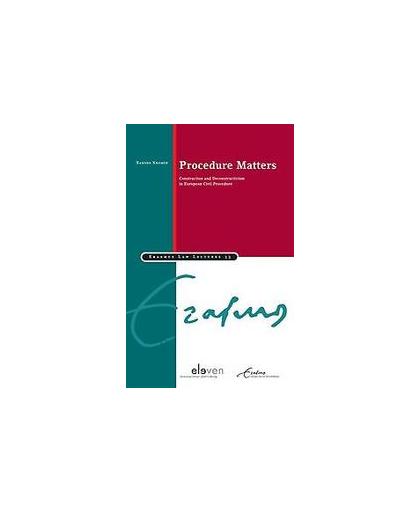

Procedure matters. construction and deconstructivism in European civil procedure, Xandra Kramer, Paperback
Available at:
On 20 January 2012, Xandra Kramer was installed as holder of the Chair of European Civil Procedure at the Erasmus School of Law, Erasmus University Rotterdam. She specialises in private international law and civil procedure, and takes an interest in empirical legal research. In 2012, she joined the Erasmus School of Law interdisciplinary research programme 'Behavioural Approaches to Contract and Tort'. In her inaugural lecture she stresses the importance of effective procedural law rules to enforce rights and act as the guarantor of fundamental rights. The enforcement of cross border rights is complicated by the huge differences in civil procedure as well as legal and practical obstacles. These complications jeopardise the right of access to justice and fair trial, and have as a result triggered the harmonisation of civil procedure. She illustrates that the gradual harmonisation of civil procedure within the EU is largely ad hoc and lacks both a vision and an architectural plan. The 'deconstructivism' in European civil procedure is a potential source of injustice and may endanger rather than improve access to justice. This necessitates a fundamental debate on the foundations and future architecture of European civil procedure in which common denominators should be access to justice, securing quality of justice, and best practices based on empirical evidence. She urges academics to be at the forefront in creating a blueprint for the future of European civil procedure.
Procedure matters
On 20 January 2012, Xandra Kramer was installed as holder of the Chair of European Civil Procedure at the Erasmus School of Law, Erasmus University Rotterdam. She specialises in private international law and civil procedure, and takes an interest in empirical legal research. In 2012, she joined the Erasmus School of Law interdisciplinary research programme 'Behavioural Approaches to Contract and Tort'.<br /> <br />In her inaugural lecture she stresses the importance of effective procedural law rules to enforce rights and act as the guarantor of fundamental rights. The enforcement of cross border rights is complicated by the huge differences in civil procedure as well as legal and practical obstacles. These complications jeopardise the right of access to justice and fair trial, and have as a result triggered the harmonisation of civil procedure. She illustrates that the gradual harmonisation of civil procedure within the EU is largely ad hoc and lacks both a vision and an architectural plan. The 'deconstructivism' in European civil procedure is a potential source of injustice and may endanger rather than improve access to justice. This necessitates a fundamental debate on the foundations and future architecture of European civil procedure in which common denominators should be access to justice, securing quality of justice, and best practices based on empirical evidence. She urges academics to be at the forefront in creating a blueprint for the future of European civil procedure. <br />
Beschrijving gevonden op Bol.com
Procedure matters
On 20 January 2012, Xandra Kramer was installed as holder of the Chair of European Civil Procedure at the Erasmus School of Law, Erasmus University Rotterdam. She specialises in private international law and civil procedure, and takes an interest in empirical legal research. In 2012, she joined the Erasmus School of Law interdisciplinary research programme 'Behavioural Approaches to Contract and Tort'. In her inaugural lecture she stresses the importance of effective procedural law rules to enforce rights and act as the guarantor of fundamental rights. The enforcement of cross border rights is complicated by the huge differences in civil procedure as well as legal and practical obstacles. These complications jeopardise the right of access to justice and fair trial, and have as a result triggered the harmonisation of civil procedure. She illustrates that the gradual harmonisation of civil procedure within the EU is largely ad hoc and lacks both a vision and an architectural plan. The 'deconstructivism' in European civil procedure is a potential source of injustice and may endanger rather than improve access to justice. This necessitates a fundamental debate on the foundations and future architecture of European civil procedure in which common denominators should be access to justice, securing quality of justice, and best practices based on empirical evidence. She urges academics to be at the forefront in creating a blueprint for the future of European civil procedure.


